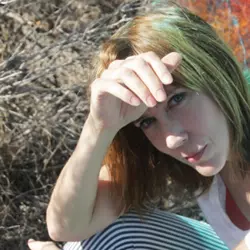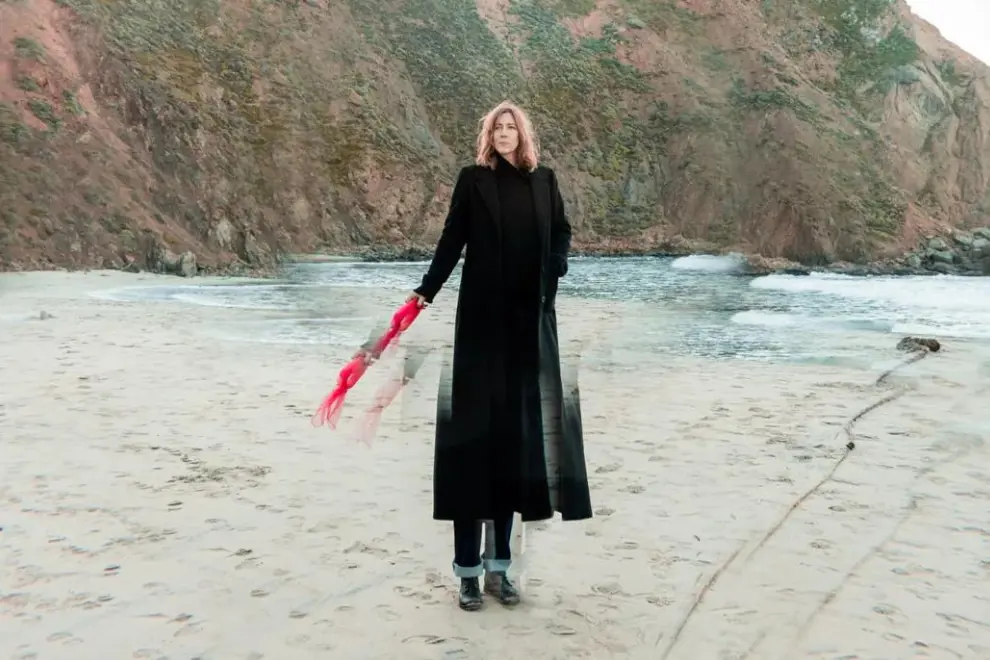 Beth Orton
Beth OrtonGenre-defying, eclectic English talent Beth Orton returns to Australia for the first time in six years as part of City Recital Hall’s Singular Voices series. It seems as though the title was made for Orton whose voice – both literal and figurative – challenges the ear with its deep nuance and surprising mellifluousness.
The titular track from Orton’s 2022 LP Weather Alive inaugurated the evening. Hints of Talk Talk’s 1988 album Spirit Of Eden emanate from this track, which built and built from meditative and intimate reflections on “the morning [where] all is dawning” to soaring cathartic outpouring of emotion on the hook, “Almost makes me wanna cry. The weather’s so beautiful outside.” All this while raucous pathos oozed from wondrous drums and the melodic undertones of Orton’s piano.
Friday Night seems to recall the melancholic and oneiric state of COVID-19 lockdowns with the magical real reference to “dreaming of Proust all in my bed” as the swish of snare meshes with the lilting movements of piano and keys and this careful wandering yet cyclical bassline. Orton’s voice is haunting, mesmerising, damaged. It lends a unique sorrow and yearning to lines like, “But now these tears are prayers of empathy And they wash me clean again.”
On Fractals, a jagged bassline confers with lubricious percussion to drive the song forward and promote Orton’s wounded voice which cracks on lines like, “I’m every person in this dream. When anything happens, it doesn't just happen to me.” Meanwhile, multi-instrumentalist Jessie Chandler’s saxophone wedges its way into the rhythm as a tale of “believing in magic” ensues.
Don't miss a beat with our FREE daily newsletter
Orton stepped away from the piano and tuned an acoustic guitar, signalling a temporal shift. “It’s been twenty-five years since Central Reservation came out. I can’t believe it,” Orton said before she launched into one of her early hits: the titular track from her 1999 album. Time certainly plays tricks as there is something respectively innocent in the premise of the song yet something prescient and enduring – a recurring motif in Orton’s discography – in the lyric: “It’s like living in the middle of the ocean, With no future, no past.”
From here, Orton moved into the opening track on her 2002 album Daybreaker. Her voice sputters on this track compared to the studio recording which includes a soaring high-noted “Sometimes...” Yet, the song remains intact given the precision of the band and remembrance of the vivid lyricism.
Orton struggles to announce, “Thank you,” before she initiates Haunted Satellite with rhythmic clapping and the meandering piano; a more speedy and scorching rendition than the studio version which really hits its strides when the bassline kicks in – almost from nothing, as if emulating the “storm” at the crux of the track. We come to understand that when Orton refers to a “haunted satellite” she is referring to herself.
Forever Young uses a trip-hop drum beat to jettison the scarred jarring vocals as Orton invokes “my love”, calling on them to “sing for me”. The transportive allusion to the “coliseum” specifies this direct address and shifts the locale drastically, filling the song’s vision with dark imagery of “madness and reason... fighting and screaming”. We come to understand this track as a love song marred by and yet defiant of the hideous, violent world.
The rattle and scrape of sticks on the rim of the snare clatter as that magic-dying voice careens into Arms Around A Memory, a painfully nostalgic song with a tenderness rendered pitiable with the epiphany, “Oh, but now California’s out of reach” and the memory’s the only thing tangible.
Back on the guitar, Orton half-joked: “We almost didn’t make it. Jesse and I were caught in Tasmania taking apples. They almost didn’t let us out.” The sound of a crying violin inspired some cheers as the folky guitar picking of She Cries Your Name takes hold. While again her voice is changed utterly, the poignancy of the lyric and the contagion of the titular hook catches you, captivates you.
The encore heralded a solo rendition of another early hit: Pass in Time. Again the sea. Again the tears. Again the doubt. Again the fear and yet it “just turn[s] into relief.” This is a glorious and profound folksong embracing traditional imagery and tropes for a new age with new specificity, afforded new significance with that failing voice which sings again “All your pain just turns into relief.”
The closing track on Orton’s most recent album continues that thread of heartache and quiet chaos. Unwritten speaks of the unspoken, the unknown and the unknowable; missed chances, miscommunications. The repeated verse is interrogative and wistful – as seems to be a signature of Orton’s beautifully damaged performance.
Earlier, local Laura Jean opened, blending what Marlon Williams dubbed “perfect pop” and pensive lyricism delivered with a wide-ranging vocal spectrum. Her talent is undeniably on display with live renditions of tracks from LPs Devotion and Amateurs as well as singles like the infectious Girls On The TV.



















